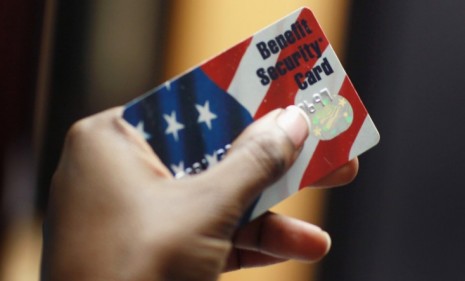Will the economy crash when government checks run out?
Millions of Americans are getting by thanks to extended jobless benefits, but everything might change when the payments stop arriving later this year

A free daily email with the biggest news stories of the day – and the best features from TheWeek.com
You are now subscribed
Your newsletter sign-up was successful
Many American families are already struggling as the recovery falters, and for some the pain will soon get worse. Nearly $2 in every $10 Americans had in their pockets last year came from government subsidies such as jobless benefits, food stamps, and Social Security, reports The New York Times. And at the end of the year some of that money will dry up, as extended unemployment payments and other benefits worth an estimated $37 billion (as per Moody's Analytics) expire. Will that kill what's left of the recovery?
Yes, it could slam the economy: We're draining money from the wallets of millions of Americans precisely when we should be pumping it in, says Steve Benen at Washington Monthly. Families are going to "start losing their buying power, which necessarily means less economic activity and a weaker overall economy." It's preventable — we could extend jobless aid, food stamps, and other hard-times programs, but "Republicans don't want to."
"Anti-stimulative policies to intensify"
The Week
Escape your echo chamber. Get the facts behind the news, plus analysis from multiple perspectives.

Sign up for The Week's Free Newsletters
From our morning news briefing to a weekly Good News Newsletter, get the best of The Week delivered directly to your inbox.
From our morning news briefing to a weekly Good News Newsletter, get the best of The Week delivered directly to your inbox.
Nonsense. This is a drop in the bucket: Calling the loss of $37 billion a "'big hit' to the American economy is absurd," says Ed Morrissey at Hot Air. Our economy amounts to around $14.3 trillion a year, so we're talking about 0.26 percent of our GDP. Losing benefits will indeed be tough for the unemployed individuals who have been receiving these checks. Halting the payments will help the rest of us though, because we're borrowing money to cover these checks, and that kills future growth.
"Will Congress extend jobless benefits again?"
We should borrow now, and cut spending later: Extending these benefits is the smart thing to do, says David Frum at FrumForum. We're "putting purchasing power into the hands of unemployed people who otherwise would see their incomes drop to near nothing." In the long term, we can deal with the deficit by cutting spending, but that can wait. "It's the unemployed who face a ticking clock. Let's address their troubles first."
"Debt talks don't need an ambitious solution"
A free daily email with the biggest news stories of the day – and the best features from TheWeek.com
-
 Currencies: Why Trump wants a weak dollar
Currencies: Why Trump wants a weak dollarFeature The dollar has fallen 12% since Trump took office
-
 Book reviews: ‘Hated by All the Right People: Tucker Carlson and the Unraveling of the Conservative Mind’ and ‘Football’
Book reviews: ‘Hated by All the Right People: Tucker Carlson and the Unraveling of the Conservative Mind’ and ‘Football’Feature A right-wing pundit’s transformations and a closer look at one of America’s favorite sports
-
 Judge blocks Trump suit for Michigan voter rolls
Judge blocks Trump suit for Michigan voter rollsSpeed Read A Trump-appointed federal judge rejected the administration’s demand for voters’ personal data